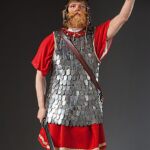In fact, unlike duplicated myths, gladiators did not always fight until they died, and gladiator schools rarely allowed death and life duels because of the very high costs of training such a warrior. Many gladiators managed to win freedom by winning many fights, then the gladiators could receive rudis (received after at least three years of combat), a wooden sword that symbolized the end of life as a gladiator and starting a new one as a free man. However, as it turns out, not everyone chose this freedom and some of them stood in the arena again.
One of the biggest names among the gladiators of ancient Rome was Flamma, although, of course, it was not his name, but rather only the battle nickname, which meant “Flame”. Before starting his career as a gladiator, he was a Syrian soldier who was captured and quickly entered the arena. He fought as secutor – a shirtless warrior armed with a gladius, a short sword and a wooden shield. His most common opponent was retiarius, i.e. a nether equipped with a harpoon or trident, dagger and net. Flamma was a very good warrior, as evidenced by his grave found in Sicily. From the epitaph that was given to him by his companion and comrade Delicatus, we can find out that he fought 34 fights, of which he managed to win 21, won a draw in 9 and lost 4 battles honourably, so he was saved. He fought stubbornly for about thirteen years, gaining immense fame, during his entire career, he was given rudis four times, so freedom was returned. Each time, Gladiator rejected the offer of life as a free man and always returned to the arena. He lived to the age of thirty when he was finally killed in battle.
It is not known why Flamma rejected the freedom offered to him four times, which so many gladiators desired. It is believed that he was tempted by prizes offered for victories and gaining fame. However, one of the reasons he was still fighting could be to show character and to confirm his people’s reputation in the war. The Romans thought very poorly of Syrians, considering them cunning cowards. Perhaps Flamma wanted through Romans’ courage and combat skills to change their minds and gain recognition.







